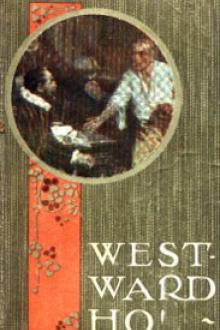Told in the East by Talbot Mundy (best fiction books to read TXT) 📖

- Author: Talbot Mundy
Book online «Told in the East by Talbot Mundy (best fiction books to read TXT) 📖». Author Talbot Mundy
As many of the outposts as could be reached were told to fight their own way in, and those that could not be reached were left to defend themselves until the big blow had been struck at the heart of things. If Delhi could be taken, the rebels would be paralyzed and the rescue of beleaguered details would be easier; so, although odds of one hundred or more to one are usually considered overlarge in wartime—when the hundred hold the fort and the one must storm the gate—there was no time lost in hesitation. Delhi was the goal; and from north and south and east and west the men who could march marched, and those who could not entrenched themselves, and made ready to die in the last ditch.
Some of the natives were loyal still. There were men like Risaldar Mahommed Khan, who would have died ten deaths ten times over rather than be false in one particular to the British Government. It was these men who helped to make intercommunication possible, for they could carry messages and sometimes get through unsuspected where a British soldier would have been shot before he had ridden half a mile. Their loyalty was put to the utmost test in that hour, for they can not have believed that the British force could win. They knew the extent of what was out against them and knew, too, what their fate would be in the event of capture or defeat. There would be direr, slower vengeance wreaked on them than on the alien British. But they had eaten British salt and pledged their word, and nothing short of death could free them from it. There was not a shred of self interest to actuate them; there could not have been. Their given word was law and there it ended.
There were isolated commands, like that at Jundhra, that were too far away to strike at Delhi and too large and too efficient to be shut in by the mutineers. They were centers on their own account of isolated small detachments, and each commander was given leave to act as he saw best, provided that he acted and did it quickly. He could either march to the relief of his detachments or call them in, but under no condition was he to sit still and do nothing.
So, Colonel Carter's note addressed to O. C.—Jundhra only got two-thirds of the way from Doonha. The gunner who rode with it was brought to a sudden standstill by an advance-guard of British cavalry, and two minutes later he found himself saluting and giving up his note to the General Commanding. The rebels at Jundhra had been worsted and scattered after an eight-hour fight, and General Turner had made up his mind instantly to sweep down on Hanadra with all his force and relieve the British garrison at Doonha on his way.
Jundhra was a small town and unhealthy. Hanadra was a large city, the center of a province; and, from all accounts, Hanadra had not risen yet. By seizing Hanadra before the mutineers had time to barricade themselves inside it, he could paralyze the countryside, for in Hanadra were the money and provisions and, above all, the Hindu priests who, in that part of India at least, were the brains of the rebellion. So he burned Jundhra, to make it useless to the rebels, and started for Hanadra with every man and horse and gun and wagon and round of ammunition that he had.
Now news in India travels like the wind, first one way and then another. But, unlike the wind, it never whistles. Things happen and men know it and the information spreads—invisible, intangible, inaudible, but positive and, in nine cases out of ten, correct in detail. A government can no more censor it, or divert it, or stop it on the way, than it can stay the birthrate or tamper with the Great Monsoon.
First the priests knew it, then it filtered through the main bazaars and from them on through the smaller streets. By the time that General Turner had been two hours on the road with his command every man and woman and child in Hanadra knew that the rebels had been beaten back and that Hanadra was his objective. They knew, too, that the section had reached Doonha, had relieved it and started back again. And yet not a single rebel who had fought in either engagement was within twenty miles of Hanadra yet!
In the old, low-ceilinged room above the archway Mahommed Khan paced up and down and chewed at his black mustache, kicking his scabbard away from him each time he turned and glowering at the priest.
“That dog can solve this riddle!” he kept muttering. Then he would glare at Ruth impatiently and execrate the squeamishness of women. Ruth sat on the divan with her face between her hands, trying to force herself to realize the full extent of her predicament and beat back the feeling of hysteria that almost had her in its grip. The priest lay quiet. He was in a torture of discomfort on the upturned table, but he preferred not to give the Risaldar the satisfaction of knowing it. He eased his position quietly from time to time as much as his bandages would let him, but he made no complaint.
Suddenly, Ruth looked up. It had occurred to her that she was wasting time and that if she were to fight off the depression that had seized her she would be better occupied.
“Mahommed Khan,” she said, “if I am to leave here on horseback, with you or with an escort, I had better collect some things that I would like to take with me. Let me in that room, please!”
“The horse will have all that it can carry, heavenborn, without a load of woman's trappings.”
“My jewels? I can take them, I suppose?”
He bowed. “They are in there? I will bring them, heavenborn!”
“Nonsense! You don't know where to find them.”
“The ayah—will—will show me!”
He fitted the key into the lock and turned it, but Ruth was at his side before he could pass in through the door.
“Nonsense, Risaldar! The ayah can't hurt me. You have taken her knife away, and that is my room. I will go in there alone!”
She pushed past him before he could prevent her, thrust the door back and peered in.
“Stay, heavenborn—I will explain!”
“Explain what?”
The dim light from the lamp was filtering in past them, and her eyes were slowly growing accustomed to the gloom. There was something lying on the floor, in the middle of the room, that was bulky and shapeless and unfamiliar.
“Ayah!” said Ruth. “Ayah!”
But there was no answer.
“Where is she, Risaldar?”
“She is there, heavenborn!”
“Is she asleep?”
“Aye! She sleeps deeply!”
There was, something in the Rajput's voice that was strange, that hinted at a darker meaning.
“Ayah!” she called again, afraid, though she knew not why, to enter.
“She
 Nowadays a big variety of genres are exist. In our electronic library you can choose any book that suits your mood, request and purpose. This website is full of free ebooks. Reading online is very popular and become mainstream. This website can provoke you to be smarter than anyone. You can read between work breaks, in public transport, in cafes over a cup of coffee and cheesecake.
Nowadays a big variety of genres are exist. In our electronic library you can choose any book that suits your mood, request and purpose. This website is full of free ebooks. Reading online is very popular and become mainstream. This website can provoke you to be smarter than anyone. You can read between work breaks, in public transport, in cafes over a cup of coffee and cheesecake.




Comments (0)